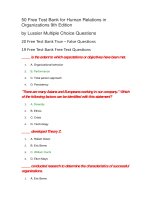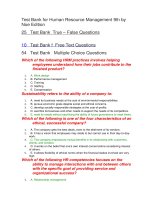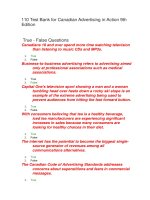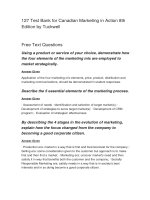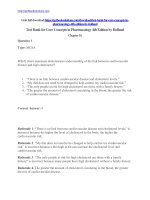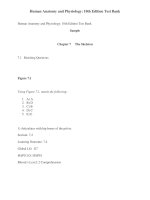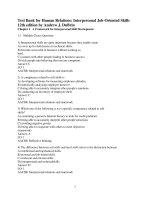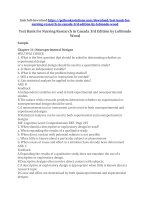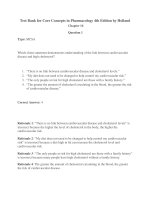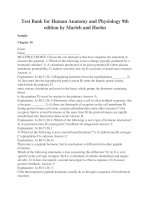89 test bank for human relations in organizations 9th edition
Bạn đang xem bản rút gọn của tài liệu. Xem và tải ngay bản đầy đủ của tài liệu tại đây (107.56 KB, 21 trang )
50 Free Test Bank for Human Relations in
Organizations 9th Edition
by Lussier Multiple Choice Questions
20 Free Test Bank True – False Questions
19 Free Test Bank Free Text Questions
_____ is the extent to which expectations or objectives have been met.
1.
A. Organizational behavior
2.
B. Performance
3.
C. Total person approach
4.
D. Persistency
"There are many Asians and Europeans working in our company." Which
of the following factors can be identified with this statement?
1.
A. Diversity
2.
B. Ethics
3.
C. Crisis
4.
D. Technology
_____ developed Theory Z.
1.
A. Robert Owen
2.
B. Eric Berne
3.
C. William Ouchi
4.
D. Elton Mayo
_____ conducted research to determine the characteristics of successful
organizations.
1.
A. Eric Berne
2.
B. William Ouchi
3.
C. Elton Mayo
4.
D. Thomas Peters
Which of the following is a fact about human relations?
1.
A. Leaders are born, not made.
2.
B. Human relations is just common sense.
3.
C. Technical skills are more important than human relations skills.
4.
D. People are an organization's greatest asset.
"Mark and Steve work very well on projects together and seem to enjoy
what they do." Their actions can be considered:
1.
A. group behavior.
2.
B. technology-oriented.
3.
C. a systems effect.
4.
D. individual behavior.
"The production department just set a record for the highest number of
units made in an eight-hour period." Which of the following levels of
behavior does this best illustrate?
1.
A. Individual
2.
B. Group
3.
C. Organizational
4.
D. Customary
"Although there are a lot of differences in the team, Neil, the supervisor,
doesn't seem deterred." Which of the following best describes Neil's
behavior?
1.
A. Being humorous
2.
B. Being genuinely interested in other people
3.
C. Being indifferent to the problems
4.
D. Being optimistic
"Donna is allowed to go home an hour earlier than the rest of us as her
babysitter leaves at four." Which of the following is this an example of?
1.
A. Performance
2.
B. Total person approach
3.
C. Systems effect
4.
D. Organization
____ skills are within the individual and include characteristics such as
personality, attitudes, self-concept, and integrity.
1.
A. Interpersonal
2.
B. Intrapersonal
3.
C. Social
4.
D. Metacommunicative
Which of the following is one of the reasons people fail?
1.
A. Being self-focused
2.
B. Being positive
3.
C. Being optimistic
4.
D. Helping others
"Jack gave the board of directors a presentation on the product launch
plan for the new product. His presentation was highly appreciated as it
covered most of the queries that the directors had about this launch."
Which of the following does Jack's action illustrate?
1.
A. Behavior
2.
B. Total person approach
3.
C. Performance
4.
D. Human relations
Which of the following is a myth about human relations?
1.
A. Human relations skills are more important than technical skills.
2.
B. Leadership skills can be developed.
3.
C. Effective leaders have good human relations skills.
4.
D. Human relations is common sense.
_____ skill is the ability to work well with a diversity of people.
1.
A. Internal
2.
B. Holistic
3.
C. Interpersonal
4.
D. Metaphysical
Which of the following is the best way to get what you want?
1.
A. Be self-focused
2.
B. Change the other person
3.
C. Change the situation
4.
D. Help other people get what they want and vice versa
_____ refused to employ children under the age of 11.
1.
A. Robert Owen
2.
B. Frederick Taylor
3.
C. Eric Berne
4.
D. Elton Mayo
"Our supervisor, Daniel, is a great guy. He appreciates the work we do and
inspires us to perform better." Which of the following best describes
Daniel's behavior?
1.
A. Being positive
2.
B. Being humorous
3.
C. Being politically correct
4.
D. Using people
Which of the following is Elton Mayo known as?
1.
A. The first manager-entrepreneur
2.
B. The real father of personnel administration
3.
C. The father of human relations
4.
D. The father of scientific management
"Prolifik, a software startup, received an award for the best new innovative
business." Which of the following levels of behavior does this best
illustrate?
1.
A. Individual
2.
B. Group
3.
C. Organizational
4.
D. Customary
The _____ realizes that an organization employs the whole individual, not
just his or her job skills.
1.
A. expectancy procedure
2.
B. personality method
3.
C. total person approach
4.
D. skill realization style
Which of the following is a human relations guideline?
1.
A. Being narcissistic
2.
B. Acting before one thinks
3.
C. Calling people by their names
4.
D. Being physically fit
Which of the following is a fact about human relations?
1.
A. Leaders are born, not made.
2.
B. Human relations is just common sense.
3.
C. High-quality relationships are important to success.
4.
D. Technical skills are more important than human relations skills.
Which of the following are also called self-management abilities?
1.
A. Interpersonal skills
2.
B. Intrapersonal skills
3.
C. Social skills
4.
D. Leadership skills
Which of the following is the most common cause of management failure?
1.
A. Technological setbacks
2.
B. Lack of recreational facilities
3.
C. Low wages
4.
D. Faulty human relations skills
"We have to find a way to improve our services to get an edge over our
competitors." Which of the following factors can be identified with this
statement?
1.
A. Changing workforce
2.
B. Ethics
3.
C. Learning and knowledge
4.
D. Diversity
_____ is the ability to influence others and work well in teams.
1.
A. Authority
2.
B. Power
3.
C. Omnipotence
4.
D. Leadership skill
Which of the following is a characteristic of successful people?
1.
A. Being narcissistic
2.
B. Being self-focused
3.
C. Having a "me only" syndrome
4.
D. Being optimistic
"Norah is a new employee who greets everyone and is hard-working."
Which of the following is this an example of?
1.
A. Performance
2.
B. Total person approach
3.
C. Behavior
4.
D. Systems effect
"Aaron is new in the company. There are thirty people on his floor. He is
having problems remembering names." Which of the following should
Aaron do to improve his ability to recall names?
1.
2.
A. Address them with titles like Mr. or Ms. and not worry about remembering
names
B. While talking to people, call them by name two or three times
3.
C. Maintain a notebook with people's photos and their respective names
4.
D. Ask them their names every time he meets them
Popularly called _____ and rooted in the behavioral sciences, the science
of human relations was developed in the late 1940s.
1.
A. organizational behavior
2.
B. occupational dynamics
3.
C. operational science
4.
D. scientific management
"The manager is developing a part-time employee work schedule for next
week and will be busy for a couple of hours." Which of the following levels
of behavior does this best illustrate?
1.
A. Individual
2.
B. Customary
3.
C. Organizational
4.
D. Group
Which of the following is a myth about human relations?
1.
A. People are an organization's greatest asset.
2.
B. Leaders are born, not made.
3.
C. High-quality relationships are important to success.
4.
D. A human relations course is as important as a technical course.
"Nancy's been in this job for only a week. She needs to ask the
accountant some questions but she doesn't remember his name." Which
of the following would be most appropriate for Nancy to do before
contacting him?
1.
A. Ask someone for the accountant's name
2.
B. Ask the accountant again for his name
3.
C. Address the account with a title like Mr.
4.
D. Get the work done without using his name
Which of the following is a leadership skill?
1.
A. Persistence
2.
B. Arbitrariness
3.
C. Capriciousness
4.
D. Anxiousness
Which of the following is an organization's most valuable resource?
1.
A. Infrastructure
2.
B. Technology
3.
C. People
4.
D. Land
Which of the following is the best way to resolve human relations
problems?
1.
A. Change oneself
2.
B. Change the situation
3.
C. Change the other person
4.
D. Ignore the problem
A _____ situation occurs when the organization and the employees get
what they want.
1.
A. zero-sum
2.
B. win-win
3.
C. stalemate
4.
D. catch 22
Which of the following statements is most likely to make people defensive
and cause arguments?
1.
A. "I disagree"
2.
B. "You're wrong"
3.
C. "I admit"
4.
D. "I understand completely"
"The new batch of executives needs to be trained on the company's social
networking platform." Which of the following factors can be identified with
this statement?
1.
A. Changing workforce
2.
B. Ethics
3.
C. Diversity
4.
D. Technology
Eric Berne introduced _____.
1.
A. sensitivity training
2.
B. transactional analysis
3.
C. the Hawthorne effect
4.
D. theory Z
Which of the following refers to an increase in performance caused by the
special attention given to employees, rather than tangible changes in the
work?
1.
A. Taylorism
2.
B. Functionalism
3.
C. Scientific management
4.
D. The Hawthorne effect
"The members of the marketing department are having a meeting. There is
a lot of disagreement over the content of the next ad." Which of the
following levels of behavior does this best illustrate?
1.
A. Individual
2.
B. Customary
3.
C. Organizational
4.
D. Group
The _____ contract is the shared expectations between people.
1.
A. biological
2.
B. physical
3.
C. psychological
4.
D. physiological
"My boss let me out early from work to see my son play in a football game.
All I had to do was get all my work done for the day before I left." Which of
the following does this illustrate?
1.
A. Organization
2.
B. Common sense
3.
C. Organizational structure
4.
D. The goal of human relations
Under the _____, all people in an organization are affected by at least one
other person, and each person affects the whole group or organization.
1.
A. total person approach
2.
B. zero-sum condition
3.
C. construct mechanism
4.
D. systems effect
The goal of _____ is to create a win-win situation by satisfying employee
needs while achieving organizational objectives.
1.
A. human relations
2.
B. production
3.
C. zero-sum condition
4.
D. cooperative games
_____ integrates common business practices in the United States and
Japan into one middleground framework appropriate for use in the United
States.
1.
A. Theory Z
2.
B. Systems theory
3.
C. Contingency theory
4.
D. Hybrid theory
_____ introduced transactional analysis during the 1960s.
1.
A. William Ouchi
2.
B. Eric Berne
3.
C. Douglas McGregor
4.
D. Peter Drucker
Which of the following was an assumption of scientific managers?
1.
A. Money was not the only motivation for workers.
2.
B. Workers always acted rationally.
3.
C. Profit would be increased if employees worked shorter hours.
4.
D. Food and housing were the prime motivation for workers.
_____ is the collective action of a company's individuals and groups.
1.
A. Organizational behavior
2.
B. Taylorism
3.
C. Scientific management
4.
D. Company objective
Transactional analysis integrates common business practices in the
United States and Japan into one middleground framework appropriate for
use in the United States.
1.
True
2.
False
Business skill is a human relations skill.
1.
True
2.
False
The focus of the first level of behavior is on the organization as a whole.
1.
True
2.
False
The systems approach focuses on the whole system with an emphasis on
the relationships between its parts.
1.
True
2.
False
The goal of human relations is to create a win-win situation by satisfying
employee needs while achieving organizational objectives.
1.
True
2.
False
Businesses during the Industrial Revolution were concerned with profits,
not employees, and managers viewed people only as a source of
production.
1.
True
2.
False
You can be a leader without being a manager.
1.
True
2.
False
People are an organization's greatest asset, not technology, because
people working together develop technology.
1.
True
2.
False
The total person approach realizes that an organization employs the
whole person, not just his or her job skills.
1.
True
2.
False
Under the Hawthorne effect, all people in the organization are affected by
at least one other person, and each person affects the whole group or
organization.
1.
True
2.
False
Leadership skills are based on one's managerial skills.
1.
True
2.
False
Leaders are born, not made.
1.
True
2.
False
Interpersonal skills are also called self-management abilities.
1.
True
2.
False
One of the reasons people fail is because they are self-focused.
1.
True
2.
False
Leadership skills are inborn and cannot be developed.
1.
True
2.
False
Human relations is just common sense.
1.
True
2.
False
Interpersonal skill is the ability to work well with a diversity of people.
1.
True
2.
False
A systems effect occurs when the organization and the employees get
what they want.
1.
True
2.
False
Technical skills are more important than human relations skills.
1.
True
2.
False
One's own behavior usually is the actual cause of human relations
problems.
1.
True
2.
False
19 Free Test Bank for Human Relations in
Organizations 9th Edition by Lussier Free Text
Questions
What are the myths about human relations? Explain.
Answer Given
Three myths about human relations are: • Myth 1: Technical skills are more
important than human relations skills—Some people believe that a human
relations or organizational behavior (OB) course is less important than more
technical courses, such as computer science and accounting. However, the reality
is that of the 26 attributes identified for job recruitment, organizations are looking
for human relations skill identified as (1) communication and interpersonal skills
(89 percent) and (2) ability to work well within a team (87 percent); • Myth 2:
Human relations is just common sense—Some people believe that human
relations is simple and just common sense. If human relations is just common
sense, then people issues wouldn't be some of the most prominent concerns of
business owners and managers. It's because high-quality relationships are so
important to success; • Myth 3: Leaders are born, not made—Some people
believe they can't develop their leadership skill, but they can if they work at it.
Effective leaders have good human relations skills. Leadership experts generally
agree that leadership skills can be developed.
_____ consists of the things two or more people do and say as they
interact. A#Group behavior
Answer Given
organization
Due to globalization, _____ becomes more important. A#diversity
Answer Given
listening
What are the 10 human relations guidelines?
Answer Given
The 10 human relations guidelines are:Be optimistic—we usually find what we're
looking for. If one looks for, and emphasizes, the positive, he will find it. Most
successful people are optimistic; Be positive—praise and encourage people.
People generally don't like to listen to others complain; Be genuinely interested in
other people—one of the reasons people fail is the "me only" (or narcissistic, selffocused, preoccupied with receiving attention and expecting special treatment)
syndrome; Smile and develop a sense of humor—a smile shows interest and
caring. Develop a sense of humor. Relax, laugh, and enjoy yourself. Be willing to
laugh at yourself; Call people by name—a person's name is the most important
sound in any language. Calling people by the name they prefer shows an interest
in them and makes them feel important; Listen to people—we learn more by
listening than we do by talking. Show respect for the other person's opinions; Help
others—if you want to help yourself, you can do so by helping others; Think before
you act—feel your emotions, but control your behavior. Try not to do and say
things you will regret later. Watch your language; don't offend people. It is not
always what you say but how you say it that can have a negative impact on
human relations; Apologize—we all sometimes do or say things (behavior) that
offends or hurts others in some way. To truly repair relationships, the best starting
point is to admit mistakes and give a "sincere" apology; Create win-win situations
—the goal of human relations is to create win-win situations. The best way to get
what you want is to help other people get what they want and vice versa.
A(n) _____ is a group of people working to achieve one or more
objectives. A#organization
Answer Given
Scientific managers
What is the Hawthorne effect? How did managers use the knowledge of
the Hawthorne studies?
Answer Given
The Hawthorne effect refers to an increase in performance caused by the special
attention given to employees, rather than tangible changes in the work. From the
mid-1920s to the early 1930s, Elton Mayo and his associates from Harvard
University conducted research at the Western Electric Hawthorne Plant near
Chicago. As a consequence of these studies, the Hawthorne effect was
discovered. With the knowledge of the results of the Hawthorne Studies, some
managers used human relations as a means of manipulating employees, while
others took the attitude that a happy worker is a productive worker.
The term _____ means interactions among people. A#human relations
Answer Given
win-win situation
How do human relations problems occur? Explain the three alternatives to
resolving a human relations problem.
Answer Given
Human relations problems often occur when the psychological contract is not met.
The psychological contract is the shared expectations between people. The three
alternatives to resolve a human relations problem are: Change the other person—
Whenever there is a human relations problem, it is easy to blame the other party
and expect her or him to make the necessary changes in behavior to meet one's
expectations. In reality, few human relations problems can be blamed entirely on
one party; Change the situation—If you have a problem getting along with the
person or people you work with, you can try to change the situation by working
with another person or other people; Change yourself— In most human relations
problems, the best alternative is to examine others' behavior and try to understand
why they are doing and saying the things they are; then examine one's own
behavior to determine why we are behaving the way we are. In most cases, the
logical choice is to change one's own behavior.
What is the goal of human relations? Explain the total person approach.
Answer Given
The goal of human relations is to create a win-win situation by satisfying employee
needs while achieving organizational objectives. A win-win situation occurs when
the organization and the employees get what they want. The total person
approach realizes that an organization employs the whole person, not just his or
her job skills. So it is important to understand the whole person. People play many
roles throughout their lives, indeed, throughout each day. One's off-the-job life will
affect his job and a bad day at work can affect personal life satisfaction too.
Define performance and explain how the systems effect affects
performance.
Answer Given
Performance is the extent to which expectations or objectives have been met.
Performance is a relative term. Performance levels are more meaningful when
compared to past performance or the performance of others within and/or outside
the organization. Since relationships are the lifeblood of organizations, poor
relations impede individual, group, and organizational performance. Under the
systems effect, all people in the organization are affected by at least one other
person, and each person affects the whole group or organization. The
organization's performance is based on the combined performance of each
individual and group. To have high levels of performance, the organization must
have high-performing individuals and groups. Groups are the building blocks of
the organization. As a result of the systems effect, the destructive behavior of one
individual hurts that group and other departments as well. In addition, the
destructive behavior of one department affects other departments and the
organization's performance.
What are competencies? Define the three human relation skills.
Answer Given
Competencies are performance capabilities that distinguish effective from
ineffective behavior, human relations, and performance: they are the underlying
characteristics of a person that lead to or cause effective and outstanding
performance: • Intrapersonal skills are within the individual and include
characteristics such as personality, attitudes, self-concept, and integrity; •
Interpersonal skill is the ability to work well with a diversity of people; • Leadership
skill is the ability to influence others and work well in teams.
The _____ realizes that an organization employs the whole person, not
just his or her job skills. A#total person approach
Answer Given
Behavior
What are some of the trends and challenges of human relations?
Answer Given
Some of the trends and challenges of human relations are: • Globalization,
change, innovation, and speed—Chief executive officers (CEOs) rate globalization
as a challenge to business leadership in the 21st century. The trend toward
globalization has clearly changed the speed and the way we do business today; •
Technology—Technology has enabled the innovation and speed we have now in
the global economy; the rate of technology change will not slow down. Because
technology is created by people, they have to use it effectively to compete; •
Diversity—Due to globalization, diversity becomes more important. One needs to
understand how to work with people around the world; • Learning and knowledge
—The key to success today is using knowledge effectively to continually innovate
in order to compete in the new global economy; • Ethics—Media coverage of
business scandals has heightened awareness of the need for ethical business
practices, as well as new corporate governance requirements.
_____ is what people do and say. A#Behavior
Answer Given
Group behavior
A _____ occurs when the organization and the employees get what they
want. A#win-win situation
Answer Given
total person approach
_____ focused on production, not people. A#Scientific managers
Answer Given
Hawthorne Studies
Explain the three levels of behavior.
Answer Given
The three levels of behavior are individual, group, and organizational. Human
relations take place at the group and organizational levels. All individuals have
different roles to play in an organization. Group behavior consists of the things two
or more people do and say as they interact. Individual behavior influences group
behavior. As individuals and groups interact, their collective behavior constitutes
the organization's behavior. Thus organizational behavior (OB) is the collective
behavior of an organization's individuals and groups. The focus of level one is on
the behavior of any one person in the organization. The focus of level two is on
the behavior and human relations within and between groups such as the
marketing, production, and finance departments. The focus of level three is on the
organization as a whole.
With the knowledge of the results of the _____, some managers used
human relations as a means of manipulating employees, while others took
the attitude that a happy worker is a productive worker. A#Hawthorne
Studies
Answer Given
diversity
